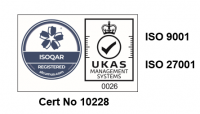Pre-employment screening in 2021
January 20th, 2021 by Jake Waddingham

As we look to 2021 here are some of the hot topics from within the pre-employment and safeguarding industry, with commentary by Jonathan Bazely, the Director of Due Diligence Checking Limited (DDC):
“Well, it’s been a bit of a difficult year for quite a lot of us and not one I would want to repeat. We hope that all of our clients, customers, applicants and colleagues have made it through as healthy and happy as possible. Here is a roundup of the last year within the pre-employment screening industry, and a look into the trends and changes in landscape for the future.”
Pre-employment checks increasing in popularity
In recent years the uptake in professional pre-employment screening has seen further increases, and 2020 was no different. One of the shifts DDC experienced was requests to undertake more of the on-boarding process, and a greater depth of screening checks for clients. This was in part driven by the furloughing of HR and recruitment teams, but also the ability to increase/decrease our processes easily and simply. DDC now have several major clients who choose which parts of their recruitment process they want DDC to undertake based upon their current work levels and internal staff numbers. This varies from a full BS7858 check with 8 screening checks, to a Baseline Personnel Security Standard (BPSS) check with 4 screening checks, to a single pre-employment check as needed.
“I can see this trend continuing well into 2021 with organisations seeking support with bulks of applications, as business returns to normal (or ‘the new normal’ as may be the case). Throughout the pandemic we’ve supported our clients with as much or as little as they need. It’s been a challenge, but the team have responded fantastically and even found the time for a nomination as finalists for Customer Service Excellence with the East Midlands Chamber of Commerce.”
Full outsourcing
Perhaps linked with the uncertainty within the economy or a desire to streamline processes in a more cost-effective manner, DDC found that tenders and ‘requests for information’ leaned towards full outsourcing. This may have been in part driven by organisations continuing to employ an increasingly mobile workforce, or perhaps due to the uncertainty and quickly changing nature of the industry. This was especially true with the movement towards virtual recruitment, and hiring new recruits to work from home, and the challenges therein.
Many of the tenders the sales team completed included a requirement for an automated connection to a recruitment platform, and the development team built an advanced api system to handle submission and requests. The organisation has invested heavily in this area during 2020 and have further plans to offer more services through the api during 2021.
“As an economy, lots of organisations have been forced to push forward with working from home arrangements and all the challenges that that brings. It is our hope that we can offer a fully outsourced solutions to relieve pressures on HR or recruitment teams, so they can focus on the person-centred functions required to support team members. There is definite shift within the industry to make process as streamlined as possible and the availability of the api connection will really help our clients to achieve greater efficiencies.”
Acceleration of electronic forms of ID
In a direct response to the Covid pandemic, the Disclosure and Barring Service and the Home Office took the unprecedented step to allow employers to verify original documents remotely, over video call or with copies to hand. Whilst this made the process easier for remote workers there still exists a requirement to see the original documents before that individual starts their role. Specific to right to work checks, their original documents must be seen within 8 weeks of the restrictions being lifted. https://www.gov.uk/guidance/coronavirus-covid-19-right-to-work-checks
It is hoped that the Home Office and the DBS can see a way to make digital identity checking a viable option. There is an ongoing pilot by the Home Office to allow organisations to check the validity of Passport details, due to be completed in July 2021.
“We really feel that this will push the pre-employment checking industry into the digital age and make recruitment processes easier for all our clients. Whilst this is just one step in the process, it’s the first step, and one that we have been advocating for a long time. There will never be a better alternative than to meet the applicant face-to-face for numerous reasons. I feel there needs to be some movement on all sides so we can make digital identity checking a thing of the present. My hope is that Government, employers and job applicants work together to make that process as easy and secure as possible.”
Basic criminal record checks increasing in popularity
As witnessed throughout 2020, HR professionals have had to adapt to remote interviewing and onboarding processes. Many new employees recruited throughout 2020 to this day have had no face-to-face contact with their employers and colleagues. As a result, DDC has seen an increase in companies adopting organisation wide policies to basic DBS check all employees. As a basic DBS check can be requested on all roles within any organisation or industry, it can be a great way to screen new and existing employees. It is anticipated that there will be rise in the number of organisations requesting basic DBS checks as part of their onboarding process.
“A basic check has been around for quite some time and we did not expect that we would see such an increase in requests in 2020, with the unemployment figures rising as a result of Covid. Having spoken with a lot of our clients and those in the industry, this appears to be driven by a desire to have additional reassurances where the application and interview process has been handled entirely remotely. This a balancing act for a lot of organisations and needs to be used effectively to support a screening process.”
How will Brexit affect pre-employment checks?
Right to work checks went through a transformation in 2020 as the new category of worker was introduced and settled status agreed as the right way to go for our European neighbours. The DDC ‘Right to Work’ service has been more popular than ever with many clients wanting reassurance that the checks have been completed correctly and in line with post-Brexit legislation.
One of the systems that was on trial by the Disclosure and Barring Service, in conjunction with Access Northern Ireland and Disclosure Scotland was the checking of vetting/conviction information with other EU states. This was under the umbrella of the European Criminal Records Information System (ECRIS) which was launched in 2012 and has been in constant development since then.
“I think with everything that has happened in 2020 a majority of the public missed that Brexit actually happened, and the recruitment and safeguarding industry was no different. One of the initiatives that I had hoped would be extended was the UK’s involvement in the ECRIS system and sharing of data across the EU. With a focus on safeguarding checks I thought this was a step in the right direction to regulate and control who we want working with our most vulnerable in society. It is not yet clear what will happen over the next 12 months with the system, or even if we will still be able to access this data as part of the trial. I am somewhat reassured that both the UK and EU see this as something that they want to continue with in the future. “
More questions?
If you have any further questions about pre-employment screening in 2021 or require assistance with basic DBS and right to work checks, speak with our experts today.





